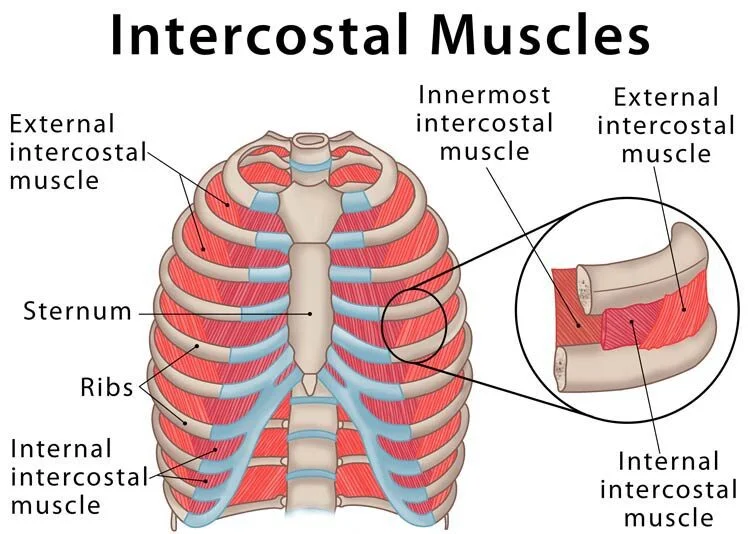Last Updated on Sunday, March 17, 2024 by Maven Carlson
Are you dealing with intercostal muscle strain? Do you have trouble sleeping? This can make it hard to feel comfortable in bed. But there are ways to help. You can sleep better and not have so many sleepless nights.
This blog post will give tips to help you sleep better at night if you have an intercostal muscle strain. We’ll show you how to make your bedroom comfortable and what activities might help with the pain. Let’s dive into the nitty-gritty of exactly what strategies can help address the painful side effects of this particular ailment!
Explain What a Strain in the Intercostal Muscle Means?
Table of Contents
Intercostal muscle strain is when it hurts in your chest. It can happen if you use or hurt the muscles between your ribs. These muscles help you breathe deeply. If left untreated, this condition can cause extreme discomfort and affect your quality of life. Getting enough sleep with intercostal muscle strain can be challenging due to the pain associated with the injury. However, there are a few strategies that may help you get some restful sleep despite the discomfort.

If you’ve recently experienced intercostal muscle strain, you may be feeling overwhelmed with managing your pain and discomfort. Thankfully, getting a good night’s rest is an effective way to help expedite your recovery!
Factors That Lead to Intercostal Muscle Strain
There are several possible causes of intercostal muscle strain. These include:
Overexertion during strenuous physical activities: Activities such as rowing, weightlifting, and even coughing or sneezing can put stress on your intercostal muscles.
- Straining while lifting heavy objects: Lifting an object, such as a box or furniture, with improper form can strain your intercostal muscles.
- Performing repetitive motions without proper form: Poor posture and repetitive motions can cause your intercostal muscles to become strained over time.
- Direct trauma to the ribs: Car accidents and falls can directly put pressure on your ribs and cause muscle strain.
- Diseases: Certain diseases could potentially lead to muscle strain in the rib area due to inflammation of the tissue.
Symptoms of Intercostal Muscle Strain
Some common symptoms of intercostal muscle strain include:
- Pain when taking deep breaths or twisting your body: You may feel a sharp pain when you take deep breaths, cough, or move your body in certain ways.
- Stiffness and soreness in the rib area: You may experience soreness and stiffness in your ribs that can make it difficult to move around comfortably.
- Muscle spasms: Your muscles may contract involuntarily due to the strain, causing them to twitch or spasm.
- Inflammation of the affected area: The area around your ribs may become red, swollen, and tender to the touch due to inflammation caused by the injury.
Diagnosis of Intercostal Muscle Strain
Intercostal muscle strain is usually diagnosed based on your symptoms and medical history. Your doctor may also order imaging tests such as an X-ray or MRI to rule out other causes of the pain.
Muscle strains are of 3 types: Grades 1, 2, and 3.
Grade 1 – Mild With this grade of strain, the muscles are stretched and slight pain may be felt when moving or stretching. The area will not appear swollen or bruised, and activities can usually still be performed with some discomfort.
Grade 2 – Moderate In this grade of strain, the muscle fibers are partially torn resulting in more severe pain and swelling. Activities that cause tension in the affected area should not be attempted as further damage may occur.
Grade 3 – Severe In this case, a full rupture of a muscle occurs resulting in extremely painful movements which often cannot be performed without excruciating pain. Bruising and swelling are also common signs of a grade 3 injury.

Treatment for Intercostal Muscle Strain
Rest is the key to treating intercostal muscle strain. It is important to avoid any activities which cause tension or pain in the affected area until you have completely recovered. Other treatments may include:
Ice/Heat Therapy: Alternating between hot and cold compresses can help reduce swelling and provide pain relief.
Medications: Over-the-counter anti-inflammatory medications, such as ibuprofen, can help reduce inflammation and relieve discomfort. However, be sure to check with your doctor before taking any medications.
Physical therapy: A physical therapist may be able to give you exercises that will strengthen your core and improve flexibility in the rib area. This can help reduce discomfort associated with the injury and aid in your recovery.
How to Sleep With Intercostal Muscle Strain
Here are a few tips that may help you get some quality sleep despite the discomfort:
- Take an over-the-counter anti-inflammatory medication before bed: Taking ibuprofen or acetaminophen prior to bedtime can reduce swelling and make it easier to fall asleep.
- Place a heating pad on your chest or back: Applying gentle heat to the affected area can help reduce discomfort and relax the muscles.
- Sleep with an extra pillow between your rib cage: Put a pillow between your ribs when you sleep on your side. This will give your body more support and help it feel better.
- Practice relaxation techniques prior to bedtime: Do things that will help you relax before going to sleep. Take deep breaths, use good smells, stretch your muscles, read a book, listen to calm music, take a hot bath or shower, and do some guided meditation. This can help you relax and reduce any anxiety that could be impairing your sleep.
- Use pain management strategies during sleep (if needed): If necessary, use techniques such as distraction or mindfulness in order to manage any pains that may arise during sleep.
- Set up a comfortable sleep space: Make sure your bed is comfy. It should have Miracle Sheets, pillows, and blankets that help you feel cozy when sleeping on your side. Additionally, consider using a heating pad or hot water bottle on your sore areas to ease the pain.
- Caffeine is known to increase alertness and energy levels – something you probably don’t need when trying to fall asleep! Avoid drinking coffee, tea, or other caffeinated beverages several hours before bedtime.
- Consider using pillows to support your body while you sleep. You can place one under your knees or one between your legs in order to provide extra cushioning and comfort. Put some pillows behind your back when you lay down. This will help you feel comfortable.
- Adjust the temperature in the room before crawling into bed as this can help create a comfortable environment conducive to sleep. If possible, try to keep the temperature slightly on the cooler side.
- Before bedtime, don’t do things that make your heart beat really fast. That can make you more stressed and energized. You should also skip any strenuous physical activity prior to hitting the hay to reduce your risk of further injury.
- Make sure that all distractions are removed from your bedroom so that you don’t get tempted by them when trying to sleep. That means no phones, laptops, tablets, or TV in the room.
These tips can help you with your muscle pain. You will feel better and sleep better. If your pain gets worse or doesn’t go away, see a doctor right away.

Leave a Reply